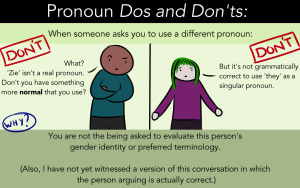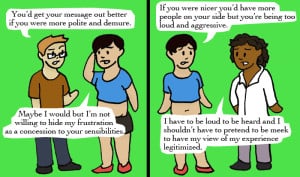As a queer woman of color surviving depression and bulimia, I am keenly aware of just how crucial it is for us to have supportive communities and empathetic friends.
It helps lessen the strains of living in a society that seeks to tread its most marginalized down from all sides.
Caring for ourselves, and each other, when no one else will is an act of radical defiance and self-preservation.
It signifies that we’re willing to recognize our inherent importance, that will we protect our communities, and that we will not be defeated by the pervasive efforts of oppression.
Because so many of us have been rejected by our birth families, or not sufficiently accepted, we often come together, defy heteronormative restrictions of what family can be, and create “chosen families.”
And ideally, a queer chosen family embodies the unconditional and accepting love that we need if we are to have any chance of thriving and flourishing.
But sometimes, our queer families can take on similar, or completely different, unhealthy dynamics and cause us just as much pain as the ones we may be fleeing.
I Lost My Friend, But Found My Self Worth in the Process
I once had a fellow queer friend who – like me – was struggling with their mental health.
Because I loved and cherished them immensely, I had vast swathes of empathy and compassion for their situation and wanted to be there for them as best I could.
We would talk at length about their problems, and I would commit everything I had to trying to help them and reassure them – even though I was going through some of the worst months of my life.
This looked like coaxing them out of bed, reminding them to tidy their room, and keeping them on top of what they needed to be doing. I would even go over and bring food for them when they hadn’t felt well enough to shop or cook.
By themselves, these acts were just fine and rooted in love.
The problem, however, was that I was doing those things for them when I could barely do them for myself. I was attempting to guide them when I desperately needed someone to guide me.
And this went on for months.
Because I was always on call to help, I rarely had the time I needed to just be alone with my thoughts. Even if I was having a “good mental health day,” I wasn’t allowing myself time to appreciate the brief sunshine in my brain as I was so invested in looking out for my friend.
Consequently, if they were down, then so was I.
Since I was spending most of my time with them, I wasn’t getting the chance to talk to or be supported by other people.
I didn’t advocate for myself and my needs because I was putting them and their needs first.
And as I became more and more emotionally drained and mentally unwell, I also found myself tainted with bitterness – something I never wanted to feel towards someone I cared about.
My friend wasn’t able or willing to put the same kind of effort into caring for me.
If I tried to talk about any distress I was experiencing, it was dismissed, pushed aside, or subsumed into their problems.
I feel that their defensive, selfish, and protective behavior was a result of the everyday stresses that they endured as a queer person of color, and they felt like they had nothing to give because they were so focused on survival.
Our friendship had stopped being an arena for mutual support and became entirely centered around me trying to help them, but getting nothing in return.
Of course, this model of friendship wasn’t sustainable, and it ended up imploding spectacularly horribly with each of us accusing the other of selfishness.
I know that my situation wasn’t unique – many queers are trying and failing to manage the symptoms of their mental health conditions and assert their boundaries while helping to alleviate those of their queer friends and chosen family.
As much as we deserve compassion and support from those close to us and vice versa, the delicate balance of nurturer versus nurtured can get out of sync, and one friend could easily begin to pour too much of themselves into the other – with little to no regard for their own needs.
But in order for us to have the kind of relationships and self-care we deserve, we need to shift these behavioral patterns right away.
But before we can make a change, we need to understand why we’re doing them in the first place.
The Problems
1. Internalized Queerphobia
As queer people who grew up in a queerphobic society, many of us have experienced so much exclusion that we sometimes question our inherent worth – and then put the needs, struggles, and desires of others ahead of our own.
I used to see my situation as somewhat hopeless.
As a depressed lesbian of color who dropped out of college, I couldn’t recognize where my future was going or envisage ever being happy or content.
I didn’t see narratives around me that said it was possible to be like me and to be truly loved or satisfied.
Love, acceptance, and contentment felt like a privilege reserved for white heterosexuals – or, at a push, white queers with tons of money.
Thus, I spent a lot of energy on trying to just be there for other people, since I felt there was not much point investing in my own life.
2. Support From Wider Society
Our compulsive care for others over ourselves might be tinged with an undercurrent of obligation – because if we don’t talk our community members down from the ledge (or put a roof over their heads, or feed them, or stay up all night with them), then who will?
Further, who will do it for us when we need it?
Mental health services are not as comprehensive and compassionate as we need them to be.
We are also aware that we might be the only support network a fellow queer person has (because they’ve been disowned, or their straight friends/family don’t understand their situation).
3. New Models of Community Care
We are dedicated to building a softer, kinder, more caring society – and want to put that into practice by doing our utmost to be the sort of kind and reliable person that we wish was more commonplace in our neoliberal, driven-by-greed world.
4. Self Doubt
We’re conditioned to believe that other people’s problems are always worse than our own.
For example, mental health issues are often disparaged as being somehow less real than physical ones, so it’s easy to internalize the message that we don’t have to look after ourselves – because we’re not “that ill.”
Queer people are also used to having people doubt our own experiences of ourselves a la “You’re not gay, you’re confused,” “You’re not trans, you’re just super gay,” or “You can’t be bisexual, you’ve got to pick a side.”
The list goes on, transforming into us being unsure of ourselves: ‘‘I’m not depressed, I just need to exercise more” (which I find myself thinking regularly) and “I don’t have anxiety, I just need to chill.”
When we minimize our problems, we feel we have more support to offer others than we actually do – often only realizing this is not true when it is too late.
5. Queer Familial Obligation
We feel a debt to the notion of “queer family,” within which we’re meant to depend on each other (due to lack of wider societal or biological family support) and stick with each other through thick and thin.
My bio family is less than perfect at supporting me with regards to my eating disorder and continues to engage in behavior that triggers my unhealthy patterns. I owe a lot of my progress in that area to fellow queers, so I’m constantly aware of what I feel is my duty to be of use to others in the same way.
The Solutions (Hint: Prioritizing Your Needs Is Truly a Selfless Act)
Things clearly need to change.
We cannot continue to bear the brunt of the reality of being queer and mentally ill while also being caretakers and ignoring our own needs.
Looking out for ourselves is imperative.
It’s akin to putting one’s oxygen mask on in an airplane first, before attending to others’.
We can’t always rely on mainstream society as queers and outcasts. Our community is phenomenal at supporting each other through our tough times, but whom can we support if we let ourselves run dry by giving all that we have away.
We run the risk of internalizing the idea that our time and mental health isn’t valuable when we continually disregard it for others.
Practicing self-care and a kindness to one’s self is the beginning of being a sweeter, softer person to those around you, too. When you feel good, you can better support the people around you in feeling good.
And because this is so important, here are six practical tips for self-preservation under pressure.
1. Share the Workload with Other Friends or Community
Don’t get swept up in the idea that you and you alone have to shoulder all the responsibility of caring for your friend.
People are often willing to be of service, especially in the tight-knit queer community, and you should let them.
Responsibilities divided are that much more manageable.
Your pride is not worth it.
2. Don’t Be Afraid to Say No
If it’s triggering for you to do something for your friend, just tell them.
Ultimately, they’re not your patient; they’re your friend.
Make it clear that there are some things you can’t do, and help them find an alternative.
Remember that your friend wouldn’t want to cause you any pain or distress.
3. Be Aware of Outside Services That Can Provide Relief
Is there a nighttime hotline that can be called instead of you if your friend is feeling very low and it’s 4am? Is there an LGBTQIA+ group that your friend can go to for a free lunch if they don’t feel up to making their own? Is there a free counselling service run by a local LGBTQIA+ charity?
Often, these things can be hard to find if you’re not in the know.
Ask someone who works in the public sector in your area (a hotbed of professional queers!) for all the inside knowledge on the best free services.
4. Put Aside Time Specifically for You
Even if it’s just an hour a week, make sure that there are times when no one is making any demands of you.
Let it be known to your friend that, for example, Friday evenings are when you take time to recharge your batteries and do what you, and only you, want.
Make it clear that it’s not about avoiding them (especially since feelings of abandonment are easily dredged up with a lot of mental health conditions), but that it’s just essential that you have some time that everyone respects as yours.
5. Communicate!
If you’re with your friend and you start to feel the reaches of stress or sadness because of the tugs on your time and spoons, tell them.
They’re not psychic.
It doesn’t have to be a long and involved chat if you don’t want to burden or worry them. But just remind them that you’re having a tough time, too.
When someone is acting in a caring position for us, it’s easy to forget that they need care, too.
Nudging this into the forefront of your friend’s mind may cause them to be more attuned with you and help them adjust their demands on you.
6. Seek Out Friends or Spaces That Can ‘Top You Up’
When you’re not having time out alone, or helping out, then you need to access people and places that have positive effects on you.
Choose to spend your free time with people who are in a good place and have the resources to listen to you and your worries and reassure you.
Put a call out on Facebook that just says “I’d like to get coffee/have a drink with someone and chat about a few things.” People who feel they’re able to do so will reach out to you. Lots of us are often just looking for people to listen to or be listened by.
***
Go forth and keep your friendships and yourselves as healthy and happy as possible!
We owe it to each other to keep our community a place of positive support.
We deserve to show each other and ourselves love.
[do_widget id=’text-101′]
Kesiena Boom is a radical, Black feminist, lesbian writer based in Manchester, England. You can read her work on BuzzFeed, Autostraddle and ForHarriet. You can follow her on Twitter via @KesienaBoom.
Search our 3000+ articles!
Read our articles about:
Our online racial justice training
Used by hundreds of universities, non-profits, and businesses.
Click to learn more





















